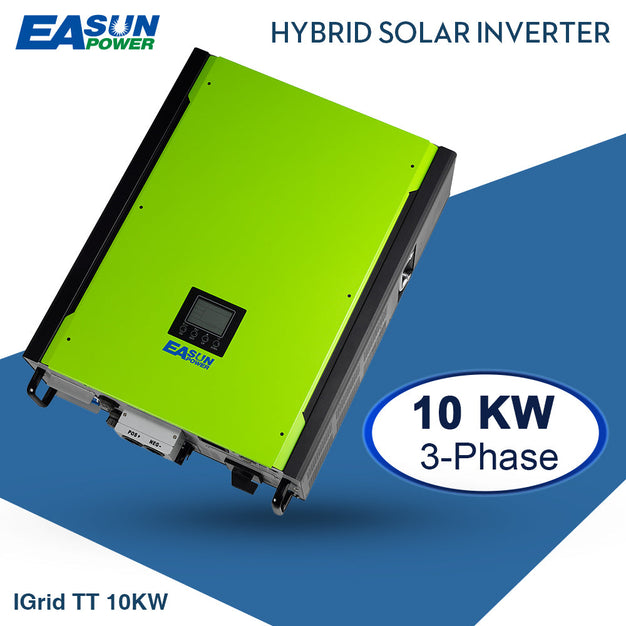Unlock the Future of Energy: Discover the Hottest Solar Hybrid Inverters You Can't Afford to Miss!
In a world increasingly focused on sustainable energy solutions, solar hybrid inverters are emerging as key players in the renewable energy landscape. These innovative devices combine the functionality of traditional inverters with the flexibility to harness multiple energy sources, such as solar and battery storage. As more homeowners and businesses seek to reduce their carbon footprint and achieve energy independence, the role of advanced technology in solar hybrid inverters has never been more significant. Investing in the latest technology in solar hybrid inverters not only enhances energy efficiency but also offers long-term savings and environmental benefits. For anyone considering a shift towards greener energy solutions, understanding the potential of these advanced inverters is essential.

Understanding Solar Hybrid Inverters
Solar hybrid inverters are sophisticated devices that blend the functions of both traditional solar inverters and battery inverters. Unlike standard inverters that only convert solar energy into usable electricity, hybrid inverters can seamlessly integrate power from solar panels, battery systems, and the grid. This means they can efficiently manage energy flow from multiple sources, providing more reliable and flexible energy usage. The main components of a solar hybrid inverter include the inverter itself, the battery storage system, and the connection to the grid. Some models even support energy management systems that provide real-time data on energy consumption and production, allowing users to optimize their energy usage based on their unique needs. By understanding these functionalities, users can better appreciate the value these inverters bring to their energy strategies.
Latest Technological Advancements in Solar Hybrid Inverters
Recent advancements in solar hybrid inverter technology have revolutionized the way we think about energy consumption and storage. One of the most significant innovations is the incorporation of smart grid capabilities, which allow inverters to communicate with the grid and optimize energy flow dynamically. This feature not only enhances efficiency but also supports demand response programs, enabling users to sell excess energy back to the grid at optimal times. Another exciting development is improved energy storage options, with new batteries that offer higher capacity and longer lifespans. Enhanced efficiency ratings are also a focal point, with many modern inverters boasting conversion efficiencies exceeding 95%. These advancements not only improve the performance of solar hybrid inverters but also make them more appealing for consumers looking to maximize their energy independence and savings.
Benefits of Upgrading to the Latest Solar Hybrid Inverter Technology
Upgrading to the latest solar hybrid inverter technology comes with numerous benefits that can significantly impact your energy management. One major advantage is enhanced energy management capabilities, allowing users to monitor and control their energy consumption more effectively. This can lead to substantial cost savings over time, as more efficient energy use translates into lower utility bills. Additionally, modern hybrid inverters contribute positively to environmental sustainability by maximizing the use of renewable energy sources and minimizing reliance on fossil fuels. Beyond financial savings, adopting this technology can foster greater energy independence, reducing vulnerability to fluctuating energy prices and grid outages. Friends who have made the switch report not only satisfaction with their reduced energy bills but also a sense of pride in their contribution to a greener planet.
Factors to Consider When Investing in Solar Hybrid Inverters
When considering an investment in solar hybrid inverters, several key factors should inform your decision. First and foremost, evaluate the efficiency of the inverter, as higher efficiency rates will directly influence your energy savings. Compatibility with your existing solar system is another crucial consideration; ensure the hybrid inverter can integrate smoothly with your current setup. It's also important to investigate warranty offerings, as a robust warranty can provide peace of mind regarding your investment. Additionally, consider future-proofing your purchase; choose inverters that can adapt to technological changes and advancements, ensuring they remain effective over the long term. By keeping these factors in mind, consumers can make informed decisions that align with their energy needs and sustainability goals.
Investing in Solar Hybrid Inverters for a Sustainable Future
In summary, the latest technology in solar hybrid inverters offers an exciting glimpse into the future of energy solutions. With their ability to integrate multiple energy sources and provide enhanced energy management capabilities, these inverters represent a significant leap forward in renewable energy technology. As we strive for sustainability and energy independence, understanding and investing in solar hybrid inverters can yield substantial benefits for both consumers and the environment. We encourage readers to explore the numerous advantages of these innovative devices and consider them as a viable investment for a greener, more efficient future.






